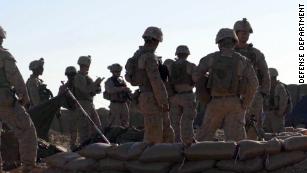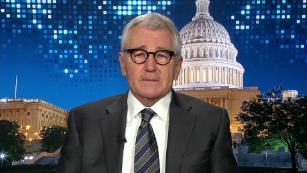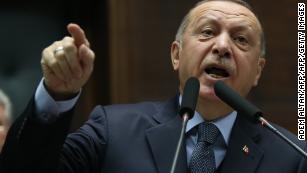Aftershocks of Trump Syria exit plan shake allies and region
Washington (CNN)Secretary of State Mike Pompeo insisted Thursday that there has been no contradiction in the shifting US strategy in Syria or confusion about it -- claims that fly in the face of shocked responses from allies in the Middle East and beyond.
As Pompeo and other US officials continue to qualify the terms and timing of a US pullout of troops from Syria -- altering President Donald Trump's December 19 assertion that forces would leave "now" -- the fallout is beginning.
CNN learned Thursday that the first US military ground equipment has been withdrawn from Syria in recent days but there's still no clarity on when troops might withdraw with Pompeo and national security adviser John Bolton refusing to commit to a withdrawal timetable in recent days.
Kurds on the frontlines of the fight against ISIS tell CNN their morale has taken a hit as they seek protection by strengthening other alliances. Arab allies, sensing a loss of US leverage on Syria, are looking to improve relations with Damascus by rekindling warmer diplomatic relations.
A basic question
Relations with Turkey have become even more deeply strained over US demands that Syrian Kurds be protected. Perhaps most profoundly, some analysts said, as the administration issues conflicting and changing statements, trust in the steadiness of US policies and the authority of its most senior officials has been further eroded.
"The most significant implication of the withdrawal decision, first and foremost, is that our allies will now have to question the confidence in which they will hold statements by our secretary of state and national security adviser and secretary of defense," said Robert Satloff, executive director of the Washington Institute for Near East Policy. "Do these senior officials speak for the President?"
"It's so fundamental to the operations of our foreign policy," Satloff continued. "I can't remember a moment, two years into an administration, when this basic question was on the table."
'No contradiction'
Pompeo insisted in a Cairo speech Thursday that under the Trump administration, the US is a stalwart presence in the Mideast. He told reporters separately that "there's no contradiction whatsoever" in the US policy on Syria, arguing that "this is a story made up by the media."
At the same time, the top US diplomat has denied allies were confused about the US withdrawal from Syria. "I think everyone understands what the United States is doing," Pompeo said as he traveled to the Middle East this week. "At least the senior leaders in their governments do."
Yet on the ground and in diplomatic circles, Trump's decision landed with explosive effect.
US allies in the region were blindsided. Two diplomatic sources say their countries were not consulted or informed and the news came as a total surprise.
'What is going on?'
Even now, as the timeline and US intentions grow less clear, a senior European diplomat told CNN that, "we are just like everyone, trying to find out what is going on. Are the US staying a la Bolton until conditions are right? Or heading off in three or four months time?"
In Shaffa, Syria, on the frontlines of the fight against ISIS, a Syrian Defense Forces commander told CNN that "we were all surprised by it," adding that the announcement "impacted us all."
"It affected our morale, and some of the soldiers and commanders asked to stop the fighting," the commander said.
Trump's abrupt move also influenced ISIS, this commander said. "It encouraged ISIS and provided them hope that they can activate sleeper cells and continue to fight harder," he said, noting that he and his men have been fighting ISIS alongside coalition forces, "especially the US," for four years now.
"This decision was not in the right time," he said.
The Kurds have become the trigger for deepening US tensions with Turkey.
The estimated 2,000 US troops in Syria work closely with a Kurdish group called the People's Protection Units, or YPG, which forms the backbone of the Syrian Democratic Forces, the main US partner on the ground.
But Turkey believes the YPG, which has controlled a large swathe of northern Syria for the past several years, is a terrorist organization.
Turkish President Recep Tayyip Erdogan had been threatening to conduct operations against the Kurds even before Trump agreed, in a phone call, to leave Syria. Bolton's insistence on protection for the Kurds made Erdogan livid, creating yet another irritant in a deeply strained US-Turkish relationship.
And facing the prospect that the US might no longer protect them against Turkish attack, Kurds have begun turning to the Assad regime and the Russians for protection.
Gulf country shift
Just as the Kurds are making adjustments to protect themselves, there is a clear shift underway among Gulf countries, as US leverage on Syria is now seen as waning.
In the wake of Trump's December 19 announcement, the US' Gulf allies, including United Arab Emirates, are ramping up their engagement with the regime of Syrian President Bashar al Assad.
Last fall, the Emirates had been considering re-opening their embassy in Syria, according to two sources familiar with the matter. The US asked them to pause, believing that the opening of embassies could be used as a carrot to draw the Assad regime into the UN-led political negotiations.
The Emirates agreed. After Trump decided to withdraw from Syria, they changed their mind.
In their view, according to the sources, any pressure the US could place on the Syrian regime would be largely blunted without a US troop presence on the ground. Further, Trump's decision to work with Turkey was not welcomed. Gulf countries believe Turkey enabled terrorist groups including ISIS and Iranian proxies to gain a hold in Syria, as their primary focus was the Kurds.
In late December, the Emirates opened their embassy in Damascus. At the time, their Foreign Ministry explained that "the step confirms that the UAE government is keen to restore relations between the two brotherly countries back to normal."
Bahrain followed the Emirates lead and the belief, among diplomats and experts, is that other countries in the region will soon follow. They say that when the domino effect begins, it will be fast, because countries will be looking to get "brownie points" with Assad for re-engaging.
In Cairo Thursday, Pompeo delivered a speech declaring that the Trump administration was correcting mistakes the previous White House made in the Middle East. "We learned that when America retreats, chaos often follows," he said.
Throughout his trip, he insisted that the US is maintaining steadfast support of allies, insisting there was no contradiction between Trump and Bolton's comments about the withdrawal, telling the press he believed "they both said the same thing."
'Now'
After Trump declared that the US would pull troops from Syria and a US Defense official told CNN that planning was underway for a "full" and "rapid" withdrawal, Bolton began adding conditions that could indefinitely delay a troop departure and has refused to discuss timelines.
"They both said we're gonna get out," Pompeo said on Monday. "The President said we're going to do it in an orderly fashion that achieves our objective and that the, our mission set in the region remains unchanged. Those seem pretty consistent to me."
In the end, it might not matter what Pompeo or Bolton says, Ege Seçkin, a principal analyst at the global risk firm IHS Markit, wrote in an analysis, noting that Trump still appears intent to pull US military personnel out of Syria.
"His demonstrated willingness to make unilateral decisions that both disregard the counsel of his advisers and contradict their public proclamations means that a withdrawal could take place regardless," Seçkin said.
CNN's Waffa Munayyer, Michelle Kosinski and Barbara Starr contributed to this report
- end quote from:
- https://www.cnn.com/2019/01/11/politics/syria-pullout-fallout/index.html




















No comments:
Post a Comment